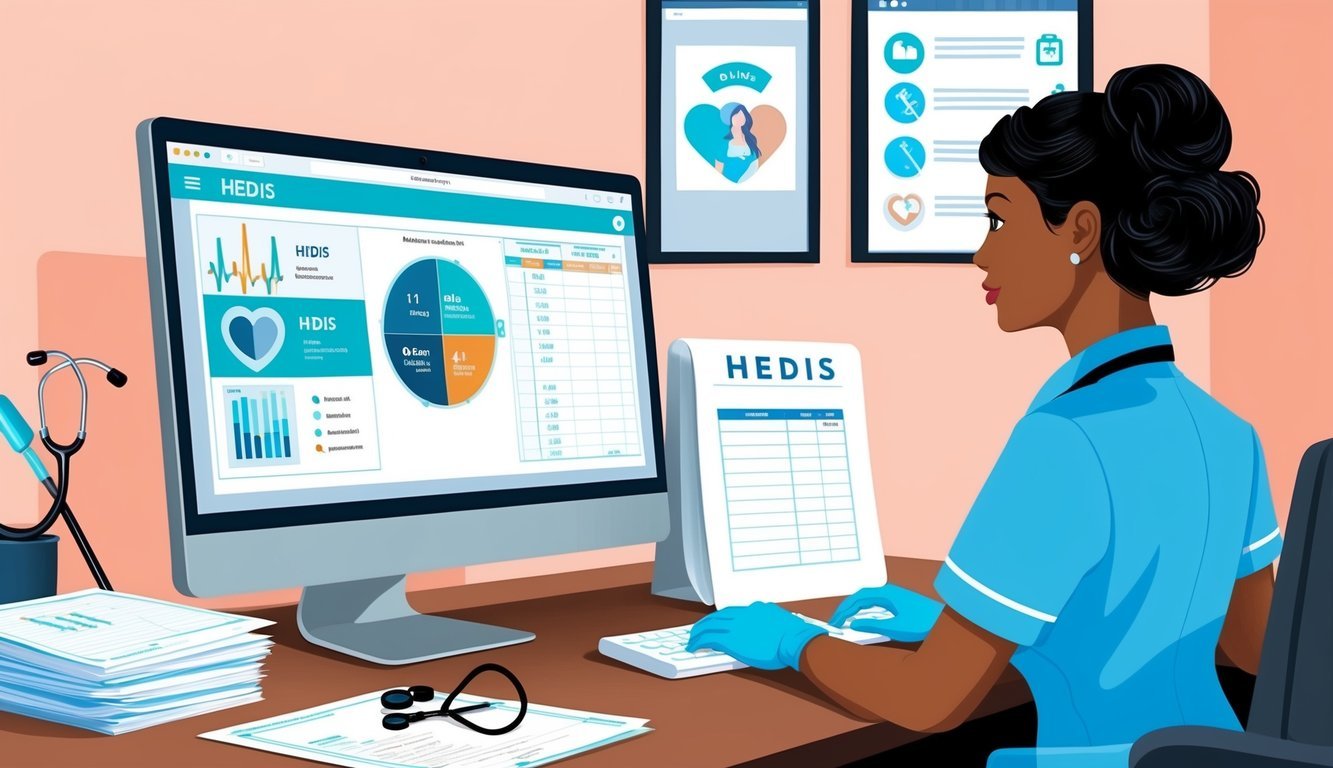As the healthcare industry continues to evolve, the role of a HEDIS nurse has become increasingly important. HEDIS nurses play a key role in using data to enhance patient care and assess the quality of health plans.
This role not only involves analyzing healthcare effectiveness data but also ensuring that healthcare providers meet necessary standards.
In your journey to understand healthcare quality, discovering the work of HEDIS nurses can be enlightening.
These professionals utilize the Healthcare Effectiveness Data and Information Set (HEDIS) developed by NCQA to drive improvements in patient care.
This blog post will explore the responsibilities, skills, and career prospects associated with being a HEDIS nurse, giving you valuable insight into this critical healthcare role.
Key Takeaways
- HEDIS nurses assess healthcare quality through data evaluation.
- This role offers opportunities for professional growth in the healthcare industry.
- Understanding HEDIS helps improve overall patient care and outcomes.
Understanding HEDIS and Its Importance in Healthcare

HEDIS, or the Healthcare Effectiveness Data and Information Set, plays a central role in improving the quality of care in healthcare.
It provides a way for health plans to measure their performance and identify areas for improvement.
This section discusses HEDIS measures, performance metrics, and the essential role health plans play in this system.
HEDIS Measures and Performance Metrics
HEDIS consists of specific measures that evaluate the quality of care provided by healthcare providers.
These measures cover various areas such as preventive services, chronic disease management, and patient satisfaction.
Some key areas include:
- Preventive Care: Immunization rates, cancer screenings.
- Chronic Disease Management: Diabetes control, hypertension treatment.
- Patient Experience: Satisfaction surveys, access to care.
The National Committee for Quality Assurance (NCQA) maintains HEDIS, ensuring that all data is collected, audited, and reported accurately.
Health plans use these measures to benchmark their performance against others, driving improvements in healthcare quality.
The Role of Health Plans in HEDIS
Health plans are crucial in implementing HEDIS measures.
They collect data on their enrollees and report performance metrics to the NCQA.
This process allows them to see how they stack up against national standards.
Health plans often provide resources to healthcare providers, aiming to enhance performance and compliance with HEDIS measures.
They also develop incentive programs to encourage providers to meet or exceed these benchmarks.
Through this structured approach, health plans help ensure that effective treatments and preventive services are accessible, ultimately fostering better health outcomes for enrollees.
As a healthcare professional, understanding this relationship can enhance your role in improving patient care quality.
The Role of a HEDIS Nurse within the Healthcare Industry
HEDIS nurses play a crucial role in improving healthcare quality by analyzing data related to patient outcomes.
They work primarily with health plans to ensure that providers meet specific care standards.
Their responsibilities are multifaceted, requiring both clinical knowledge and administrative skills.
Key Responsibilities of HEDIS Nurses
As a HEDIS nurse, your main job is to analyze medical records and other data sources to assess the quality of care provided by health plans.
You will gather and evaluate patient records to determine compliance with national health care standards.
Key tasks include:
- Conducting audits of health insurance claims to verify accuracy.
- Collaborating with healthcare providers to collect necessary data.
- Preparing reports that summarize findings and identify areas for improvement.
You are vital in ensuring that health plans meet regulatory requirements and maintain their quality ratings.
Qualifications and Nursing Degree Requirements
To become a HEDIS nurse, you typically need at least an Associate’s Degree in Nursing (ADN), though a Bachelor’s Degree in Nursing (BSN) is preferred.
Licensing as a Registered Nurse (RN) is essential, as you will be using clinical judgment in data analysis.
Additional qualifications may include:
- Experience in HEDIS nursing or quality improvement roles.
- Understanding of coding and healthcare data reporting.
- Familiarity with health insurance policies and healthcare regulations.
Staying updated on HEDIS metrics and healthcare guidelines is also crucial for success in this role.
Understanding Healthcare Plans and Provider Data
Your role requires a strong understanding of healthcare plans and how they interact with provider data.
This knowledge helps you assess how well healthcare providers are performing against HEDIS standards.
You will work with:
- Various health plans to understand their goals.
- Data from multiple sources to evaluate care quality.
- Tools that measure the effectiveness of healthcare services.
By analyzing this data, you contribute to enhancing patient care and ensuring that healthcare providers deliver quality services.
Professional Skills and Competencies for HEDIS Nurses
As a HEDIS nurse, you need a unique set of skills that ensure high-quality patient care and accurate data reporting.
Mastering these competencies is essential for success in this role.
Attention to Detail and Quality Assurance
Attention to detail is critical for HEDIS nurses.
You will be reviewing patient records and quality metrics to ensure compliance with healthcare standards.
A small mistake can lead to inaccurate reporting, affecting patient care and overall outcomes.
Quality assurance involves implementing processes to uphold these standards.
Familiarity with medical terminology and industry guidelines helps you identify errors and discrepancies.
Tools such as checklists or detailed review protocols can assist you in maintaining high standards.
Medical Coding and Data Abstraction
Medical coding skills play a vital role in your work as a HEDIS nurse.
You need to accurately translate patient diagnoses and procedures into standardized codes.
This is essential for data reporting and analysis.
Data abstraction is another important competency.
You will extract relevant information from health records for quality measurement.
Understanding medical coding systems, such as ICD-10 and CPT, is necessary.
Training in this area can significantly enhance your effectiveness and efficiency.
Communication and Analytical Skills
Strong communication skills help you work with healthcare teams and explain findings clearly.
You need to collaborate with other nurses, physicians, and administrators to improve quality of care.
Being able to articulate complex information in simple terms can foster better teamwork.
Analytical skills are also important.
You will analyze data to identify trends in patient outcomes and quality metrics.
This can help improve service delivery.
Using software tools for data analysis can enhance your ability to interpret results effectively.
Employment and Career Outlook for HEDIS Nurses

As a HEDIS nurse, understanding your employment options and career outlook is vital.
This includes knowing the job market, compensation, and the unique aspects of contract work.
Below are important details about the employment landscape for HEDIS nurses.
Job Market and Compensation
HEDIS nursing has a positive job market outlook.
The demand for registered nurses is expected to grow by 7% between 2019 and 2029, influenced by the increasing need for healthcare services.
HEDIS nursing roles may follow this trend.
Here’s a quick look at potential salaries:
| Experience Level | Salary | Hourly Rate |
|---|---|---|
| Entry Level | $55,530 annually | $26.70 |
| 1-4 Years | $60,450 annually | $29.06 |
| Experienced | $70,000+ annually | $33.65+ |
Compensation varies based on experience and location.
For instance, rates may range from $35 to $40 per hour, especially in remote roles.
Contract Work and Flexibility
One appealing aspect of being a HEDIS nurse is the option for contract work.
Many positions are seasonal, allowing for flexibility in scheduling.
This can be an excellent fit for those seeking work-life balance.
You can work full-time or part-time and even take on additional shifts if desired.
Remote work is also increasingly common, providing the ability to work from home.
This can help reduce commuting time and costs.
Pros and Cons of Being a HEDIS Nurse
While HEDIS nursing has many advantages, such as good pay and flexible hours, there are also drawbacks.
Pros:
- Job Security: The ongoing need for healthcare data analysis supports stable job opportunities.
- Good Compensation: Competitive salaries encourage many to enter the field.
- Remote Work: Your ability to work from home offers enhanced flexibility.
Cons:
- Non-Clinical Nature: If you prefer hands-on patient care, this role might feel limiting.
- Seasonal Work: Some roles might not offer year-round employment, impacting consistency in income.
Being aware of these factors can help you make informed career decisions in the HEDIS nursing field.
Working Environment and Impact on Patient Care

The working environment in healthcare directly influences patient care quality.
Factors such as facility resources and nursing staff support play vital roles in shaping the experiences of both nurses and patients.
This section explores how healthcare facilities and quality improvement initiatives contribute to better outcomes.
Healthcare Facilities and Providers
Healthcare facilities, like hospitals and nursing homes, must maintain adequate resources for effective patient care.
The layout, equipment, and technology available can greatly affect the nurse’s ability to deliver prompt and efficient care.
Key aspects to consider:
- Staffing ratios: Inadequate nurse-to-patient ratios can lead to increased workloads, impacting care quality.
- Supportive environment: Positive relationships between healthcare providers enhance collaboration and communication, leading to improved patient outcomes.
For example, health maintenance organizations (HMOs) often emphasize coordinated care, which enhances communication among providers and benefits patient care.
Quality Improvement Initiatives
Quality improvement initiatives focus on enhancing care delivery through systematic changes and assessments.
Many healthcare facilities adopt frameworks like Plan-Do-Study-Act (PDSA) to ensure ongoing improvements.
Essential components include:
- Data collection: Gathering and analyzing patient feedback helps identify areas for improvement.
- Education and training: Regularly offering training for nurses enhances skills and keeps staff current with best practices.
Efforts like patient safety programs and performance improvement projects are integral in ensuring that care meets the highest standards.
By fostering a culture of continuous improvement, healthcare providers can significantly impact patient care quality.
Frequently Asked Questions

In this section, you will find answers to common questions about the role of a HEDIS nurse.
These details will help you understand the salary, responsibilities, qualifications, and potential job opportunities in this field.
What is the typical salary range for a HEDIS nurse?
The typical salary range for a HEDIS nurse varies based on experience and location.
Generally, you can expect the salary to fall between $60,000 and $90,000 annually.
Some experienced nurses may earn even more, especially during the HEDIS season when demand increases.
What are the common job responsibilities of a HEDIS nurse?
As a HEDIS nurse, you review medical records, collect data, and ensure that healthcare providers meet quality standards.
You may also prepare reports and collaborate with healthcare teams to improve patient outcomes.
Are there remote job opportunities available for HEDIS nurses?
Yes, there are remote job opportunities for HEDIS nurses.
Many healthcare organizations offer remote positions that allow you to work from home.
During this time, you will review records and perform data analysis.
What certifications are necessary to become a HEDIS nurse?
While specific certifications are not always required, having a nursing license and certifications in Quality Assurance or Healthcare Quality can be beneficial.
These credentials demonstrate your understanding of quality improvement processes and data analysis.
What qualifications are required to work as a HEDIS nurse?
To work as a HEDIS nurse, you typically need a nursing degree (ASN or BSN) and experience in clinical settings.
Familiarity with HEDIS measures and data collection processes is also important for success in this role.
How can an individual with no previous experience get involved in HEDIS work?
If you have no previous experience, consider starting with an entry-level position in healthcare to gain relevant skills.
You can also seek internships or volunteer opportunities that focus on quality improvement in healthcare settings to build your knowledge of HEDIS work.

